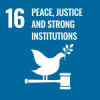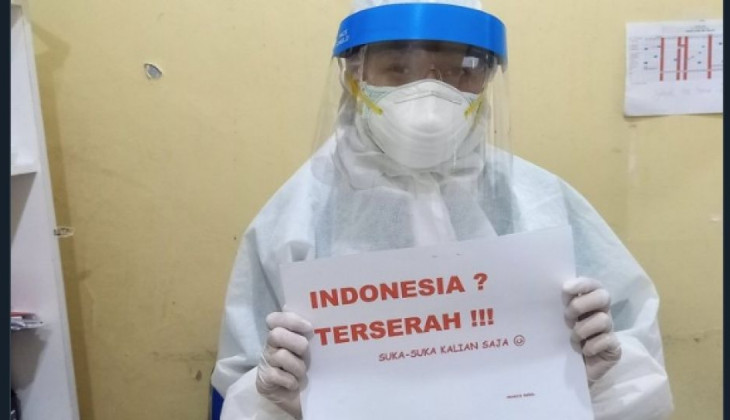Social media users or netizens are disappointed by the inconsistency and weakness of government coordination in handling Covid-19. It is added with the non-compliance of some communities toward health protocols.
This was recorded in the findings of the Research Center for Politics and Government of the Department of Politics and Government, Faculty of Social and Political Sciences, Gadjah Mada University. Through the Big Data Analytics Laboratory, PolGov DPP UGM analyzed conversations on the Twitter platform from 14-18 May 2020.
UGM PolGov researcher, Wegik Prasetyo, said the two problems triggered disappointment for most medical personnel. They view the hard work that has been done so far in tackling Covid-19 has not been followed by commitment, discipline, and consistency by the government and parts of the community.
“Disappointment of medical personnel expressed through social media in May 2020 was amplified by the public through the hashtags #indonesiaterserah and #terserahindonesia,” he explained when releasing the results of his recent research.
Wegik said the discussion could be interpreted as a description of the problem of public trust and cynicism towards the government over the handling of Covid-19 in Indonesia, which is considered inconsistent. Furthermore, there is public anxiety about the direction of the growth of community behavior that are beginning to ignore existing health protocols.
The public conversation on the social media Twitter discusses various examples of policy inconsistencies and the asynchronization between policies issued by the government. One of them is related to the implementation of Large-Scale Social Restrictions (PSBB) which are often considered inconsistent with other policies, such as policies related to mudik or homecoming, transportation, prohibiting crowds of residents, and so on.
Conversations with the hashtags #indonesiaterserah and #terserahindonesia first appeared on Thursday, May 14, 2020 as a response to the opening of domestic flights which resulted in the accumulation of queues for prospective passengers at Soekarno Hatta Airport. This congested queue is considered to ignore health protocols. The conversation on Twitter scrutinizes that the incident at Soekarno Hatta airport is not in line with the policy of restricting land transportation between provinces, especially on the island of Java. The inconsistency of this policy has created a loophole that is exploited by some communities to violate health protocols.
“This public concern and disappointment is reflected in the escalation of the frequency of tweets on Friday, May 15, 2020, which reached 3,758. The hashtags #indonesiaterserah and #terserahindonesia were trending topics on Twitter, “he said.
Analysis of the two hashtags during May 14-18 2020 managed to record a total of 10,581 tweets. Most of the tweets’ locations were identifiable, with five provinces in Java occupying the top ranks, namely West Java (650 tweets), East Java (590 tweets), DKI Jakarta (570 tweets), Central Java (420 tweets), Yogyakarta (350 tweets) and followed by Banten (100 tweets).
Wegik said that public trust in the government plays an important role, so policies related to handling Covid-19 receive broad support. Consistency in basic principles and synchronization between policies in handling Covid-19 as well as strong public support is strongly thought to help increase effectiveness in suppressing and breaking the chain of COVID-19 transmission.
On the other hand, inconsistencies and failures in synchronization between policies and among elements of the government do not only prolong the pandemic period, but also has the potential to worsen the economic and health crisis.
Based on the research results, PolGov UGM has proposed a number of recommendations to strengthen public trust. First, the government needs to respond to public criticism by producing policies that are integrated, directed and consistent with certain basic principles. Therefore, a basic regulation is needed as the basis for handling Covid-19. This basic regulation lays down the basic principles that become the reference for all derivative rules and sectoral rules.
“This principle concerns openness, public participation, coordination and data-based policies, for example,” he said.
Second, the need for flexible space for policy evaluation must be opened so that the government can be adaptive to the latest developments. This is necessary given the very complex problems brought on by the Covid-19 pandemic. Although the room for policy adaptation is opened, the basic principles must still be adhered to.
Third, it is necessary to adapt policies to existing developments that must be based on strong and accountable data.
“Changes in existing policies also need to be communicated widely and continuously with arguments that are easy for the public to understand,” he concluded.



